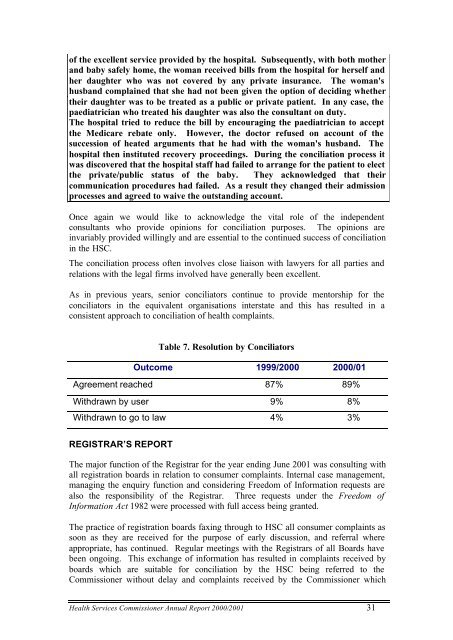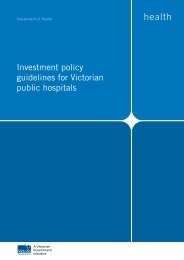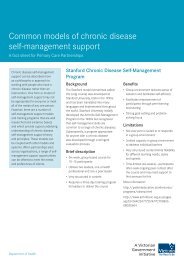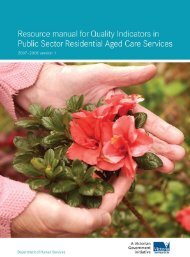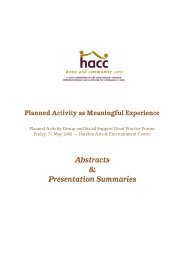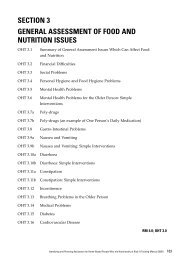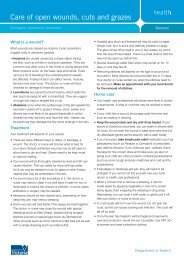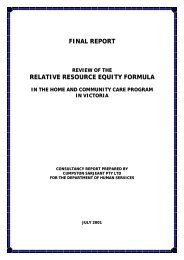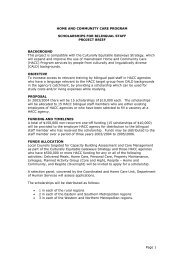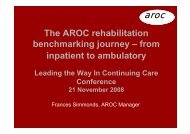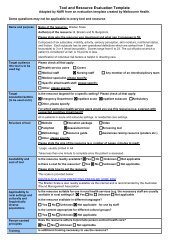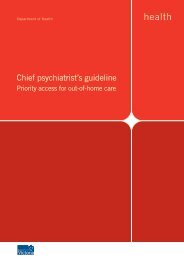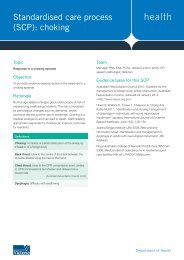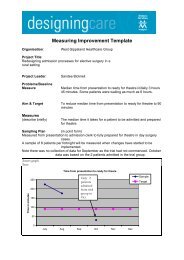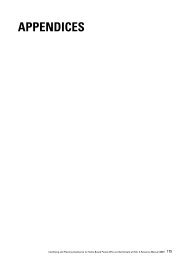Health Services Commissioner Annual Report 2000/2001
Health Services Commissioner Annual Report 2000/2001
Health Services Commissioner Annual Report 2000/2001
Create successful ePaper yourself
Turn your PDF publications into a flip-book with our unique Google optimized e-Paper software.
of the excellent service provided by the hospital. Subsequently, with both mother<br />
and baby safely home, the woman received bills from the hospital for herself and<br />
her daughter who was not covered by any private insurance. The woman's<br />
husband complained that she had not been given the option of deciding whether<br />
their daughter was to be treated as a public or private patient. In any case, the<br />
paediatrician who treated his daughter was also the consultant on duty.<br />
The hospital tried to reduce the bill by encouraging the paediatrician to accept<br />
the Medicare rebate only. However, the doctor refused on account of the<br />
succession of heated arguments that he had with the woman's husband. The<br />
hospital then instituted recovery proceedings. During the conciliation process it<br />
was discovered that the hospital staff had failed to arrange for the patient to elect<br />
the private/public status of the baby. They acknowledged that their<br />
communication procedures had failed. As a result they changed their admission<br />
processes and agreed to waive the outstanding account.<br />
Once again we would like to acknowledge the vital role of the independent<br />
consultants who provide opinions for conciliation purposes. The opinions are<br />
invariably provided willingly and are essential to the continued success of conciliation<br />
in the HSC.<br />
The conciliation process often involves close liaison with lawyers for all parties and<br />
relations with the legal firms involved have generally been excellent.<br />
As in previous years, senior conciliators continue to provide mentorship for the<br />
conciliators in the equivalent organisations interstate and this has resulted in a<br />
consistent approach to conciliation of health complaints.<br />
Table 7. Resolution by Conciliators<br />
Outcome 1999/<strong>2000</strong> <strong>2000</strong>/01<br />
Agreement reached 87% 89%<br />
Withdrawn by user 9% 8%<br />
Withdrawn to go to law 4% 3%<br />
REGISTRAR’S REPORT<br />
The major function of the Registrar for the year ending June <strong>2001</strong> was consulting with<br />
all registration boards in relation to consumer complaints. Internal case management,<br />
managing the enquiry function and considering Freedom of Information requests are<br />
also the responsibility of the Registrar. Three requests under the Freedom of<br />
Information Act 1982 were processed with full access being granted.<br />
The practice of registration boards faxing through to HSC all consumer complaints as<br />
soon as they are received for the purpose of early discussion, and referral where<br />
appropriate, has continued. Regular meetings with the Registrars of all Boards have<br />
been ongoing. This exchange of information has resulted in complaints received by<br />
boards which are suitable for conciliation by the HSC being referred to the<br />
<strong>Commissioner</strong> without delay and complaints received by the <strong>Commissioner</strong> which<br />
<strong>Health</strong> <strong>Services</strong> <strong>Commissioner</strong> <strong>Annual</strong> <strong>Report</strong> <strong>2000</strong>/<strong>2001</strong> 31


